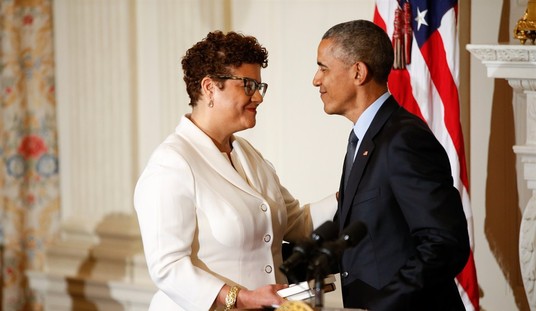We talk a lot about judicial activism. Rarely have we seen it in as pure a form as in Judge Colleen Kollar-Kotelly’s courtroom. In the middle of a criminal trial of ten people accused of conspiring to block access to abortion clinics, Kollar-Kotelly announced that she might have found the elusive reference to a right to an abortion in … the Thirteenth Amendment.
Motherhood is slavery, right?
U.S. District Court Judge Colleen Kollar-Kotelly for the District of Columbia wrote the high court’s landmark decision in Dobbs v. Jackson Women’s Health Organization only determined whether the 14th Amendment included a right to abortion but declined to further analyze whether other constitutional amendments confer the right to women.
“It is entirely possible that the Court might have held in Dobbs that some other provision of the Constitution provided a right to access reproductive services had that issue been raised,” Kollar-Kotelly wrote. “However, it was not raised.”
In fairness — briefly, anyway — it appears that this argument started with attorneys representing the pro-life activists being prosecuted. They argued that the FACE Act and other federal law protecting abortion clinics no longer apply after the Dobbs decision. After the Supreme Court returned the question of abortion back to the states, they argued, Congress lost its jurisdiction:
Attorneys for one defendant, Lauren Handy, claimed that “there is no longer a federal constitutional interest to protect, and Congress lacks jurisdiction,” adding that “the Dobbs court did not indicate that there is no longer a constitutional right to abortion; the court has made clear there never was.”
One could argue that Congress had other means of jurisdiction in such cases; the Interstate Commerce Clause has gotten abused so badly that it might apply, plus the nationalization of health care regulation under ObamaCare would get argued, too. It’s still a pretty interesting argument, even if it’s not likely to help the defendants at trial. It’s more of an issue for attorneys to pursue on appeal.
Rather than just dismiss the argument as outside the trial court’s authority, however, Kollar-Kotelly came up with a sillier response — the dog-that-didn’t-bark rebuttal. No one raised the Thirteenth Amendment argument in Dobbs, so therefore the matter isn’t settled, she suggests — and wants attorneys on both sides to brief her on it.
Ahem. Does Kollar-Kotelly think that abortion advocates would have inadvertently overlooked that argument? Does she believe that the three liberal justices would have let it go unremarked in their dissent in Dobbs? As much litigation that has transpired around Roe and Casey over the last few decades, somehow only Kollar-Kotelly has discovered the magic formula for unlocking their defense?
Maybe she got it from an emanation from a penumbra, or something.
It never got argued in Dobbs because it’s an idiotic argument. The Thirteenth Amendment prohibits slavery and indentured servitude, not the consequences of procreative activity. It has a specific reason for its passage and ratification, and specific impact.
Constitutional law professor Jonathan Turley notes the lengthy history of this argument, which itself cuts against the idea that the principals in Dobbs didn’t know about it. Plus, Turley also laughs at the desperation of the idea that just because an argument wasn’t made, it somehow keeps the question open:
It is also true that the Supreme Court also did not rule out a theory based on the Preamble. That “possibility” does not make a Preamble claim viable or credible after Dobbs. It also did not rule out a Ninth Amendment claim, but it still sent the matter back to the states.
The long historical analysis considered whether abortion was viewed as a protected right at the time of the Framers. The Court concluded that it did not. As discussed in prior decisions, it is worth mentioning that at the time of the ratification of the Thirteenth Amendment, December 18, 1865, 27 of the 36 states had enacted statutes prohibiting abortion, including 21 of the 27 ratifying states. …
The Court itself has rejected expansive readings of the 13th Amendments, including in Arver v. United States, 245 U.S. 366 (1918), where it rejected such a claim to challenge military conscription. Moreover, the Court has long rejected “novel” 13th Amendment arguments. In Robertson v. Baldwin, 165 U.S. 275, 282 (1897), the Court stated:
“[T]he amendment was not intended to introduce any novel doctrine with respect to certain descriptions of service which have always been treated as exceptional; such as military and naval enlistments, or to disturb the right of parents and guardians to the custody of their minor children or wards.”
Judge Kollar-Kotelly should stick to the case at hand, in which ten people may lose their liberty, rather than meddle in civil cases already resolved by the Supreme Court. Even the liberal justices on the Supreme Court might not look too favorably on Kollar-Kotelly’s implied accusation of incompetence, or her use of a criminal trial to reopen a civil decision. If she wants to challenge Dobbs, Kollar-Kotelly can step down from the bench and open a law firm to represent plaintiffs in such matters.








Join the conversation as a VIP Member